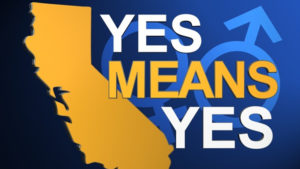The state of California has defined by law what it means when “yes means yes” on college campuses. The state Senate approved this decision unanimously. This will alter the way that sexual assault cases and allegations are investigated in California. The bill has also been signed by the state’s governor, Jerry Brown.
All college students in the state who are receiving government funds for tuition have to use the “yes means yes” standard when it comes to sexual assault investigations. The bill also states a clear definition of “consensual” as “affirmative, conscious and voluntary agreement to engage in sexual activity.” The bill also states that “a lack of protest or resistance does not mean consent, nor does silence mean consent.” This clause was added to the bill to emphasize that a person cannot give sexual consent when he/she is under the influence of drugs and alcohol, since these substances can cause severe lapses in judgment.
Now that the bill has been passed for California colleges, lawmakers in the state are also working to bring the “yes means yes” bill to high schools in California. The bill is essentially an outline of the standards for sexual consent, and is referred to as SB 695. The bill requires high school students to take a health education class before graduating, which includes training on affirming sexual consent.
Senate president and co-author of SB 695 Kevin de Leon stated that “this bill represents the next step in the fight to change behavior towards women, particularly young women.” He also stated that California must lead the rest of the country when it comes to educating young people about healthy and respectable dating and relationships. De Leon also stated that sexual activity doesn’t begin in college. For many young people, it starts in high school, and sometimes before then. He emphasized that students’ exposure to the “yes means yes” concept should occur before they reach college. De Leon shared that between the years of 1995 and 2013, many girls between the ages of 18 and 24 were likely sexual assault victims.
Statistics from the U.S. Justice Department also point out that women who are not enrolled in college are 1.2 times more likely to be sexually assaulted or raped when compared with women who had higher education. The study also revealed that 80 percent of sexual assault victims knew the person who attacked them. This is one major reason that SB 695 should be introduced to young people before they graduate from the public education system.
This could come as good news for young Black women. 
California may be leading the nation in the “yes means yes” bill, but other college campuses are considering adopting SB 695 as well. The state of New York has adopted the bill for its public college campuses, and Colorado, Maryland and New Hampshire are considering the bill as well.
While the bill has its positive points, it has been met with some controversy, since some fear that it will be hard to determine whether the bill is actually being implemented.
American River College professor of human sexuality Emilie Mitchell shared that the controversy over the bill will likely die down as more and more students become familiar with it. Mitchell compared the “yes means yes” bill with laws created to prevent sexual harassment in the workplace. Critics complained about this bill as well, stating that it could be deemed illegal to give a co-worker a compliment. She has decided to teach SB 695 to her students, and states that it teaches “mutual responsibility.” Mitchell indicated that she will emphasize to her students that consent is obvious. Affirmative consent sends the message that both parties want to engage in sexual activity, as opposed to one party waiting for the other to speak up and say that the activity should not continue.
SB 695 moves to California State Assembly for further debate.

